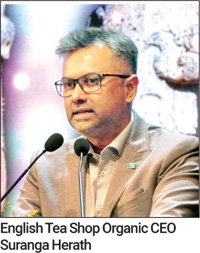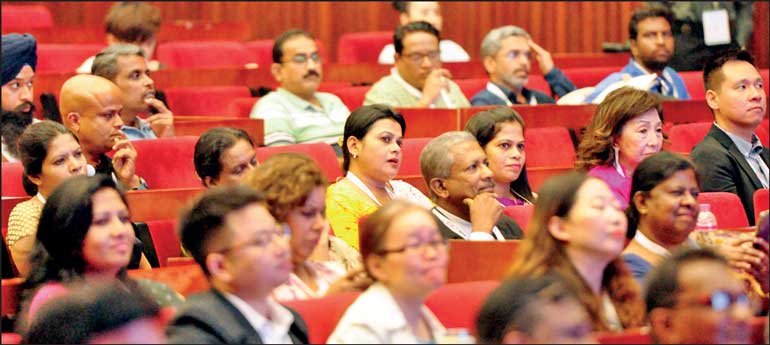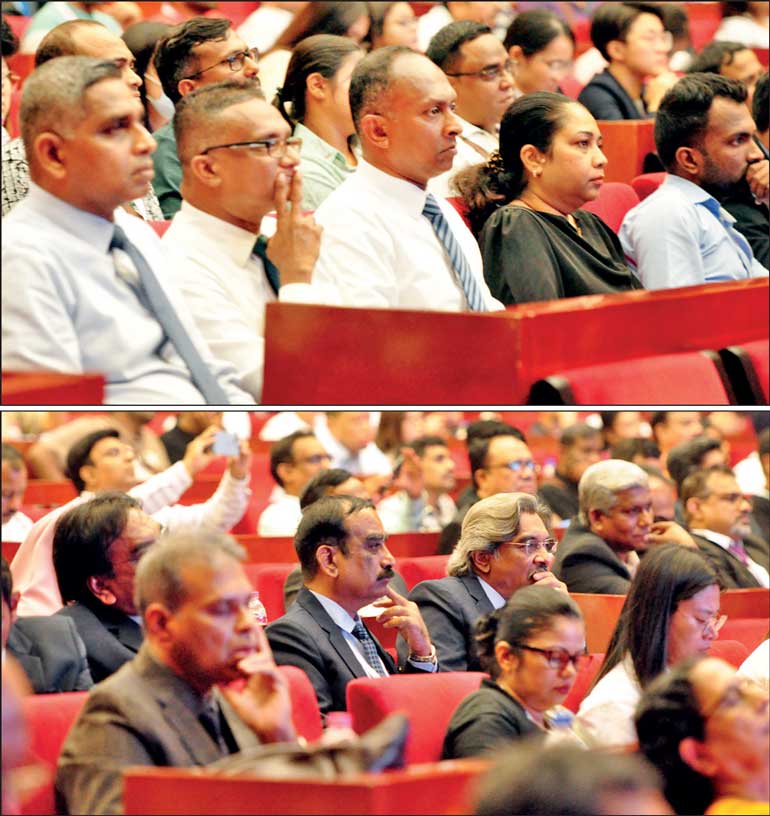Wednesday Feb 18, 2026
Wednesday Feb 18, 2026
Wednesday, 13 November 2024 00:06 - - {{hitsCtrl.values.hits}}

 Over 2,000 delegates from 14 countries converge to discuss “Beyond Boundaries: A Quest for Quality and Productivity and Innovation”
Over 2,000 delegates from 14 countries converge to discuss “Beyond Boundaries: A Quest for Quality and Productivity and Innovation”By Janani Kandaramage
The 49th Annual International Convention on Quality Control Circles (ICQCC), organised by the Sri Lanka Association for the Advancement of Quality and Productivity (SLAAQP), was inaugurated in a colourful event at the Bandaranaike International Memorial Hall (BMICH), Colombo.
Taking place from 11 to 13 November at the Mount Lavinia Hotel, the Convention, themed ‘Beyond Boundaries: A Quest for Quality and Productivity and Innovation,’ welcomed a gathering of over 2,000 delegates from 14 member countries, including Japan, China, Thailand, Philippines, Mauritius, Bangladesh, Korea and Singapore. It aims to foster collaboration and knowledge exchange between organisations with diverse fields around the globe.
Chief Guest Prime Minister Dr. Harini Amarasuriya addressing the Convention virtually said: “This convention signifies a huge milestone in our nation’s journey towards excellence and international collaboration. I am proud to note that this convention showcases Sri Lanka’s emerging role as a global power on dialogue over quality, productivity and innovation.”
She also highlighted that the timing of the event is significant to Sri Lanka as it comes at a time when the nation is working on strengthening its economy and global competitiveness, making the principle of quality control and continuous improvement never more relevant. She noted, “The success stories and best practices that will be shared over these few days will contribute immensely to our collective knowledge and capabilities in Sri Lanka.”
The Prime Minister encouraged delegates to effectively utilise the international research conferences, business forum and industry visits as an opportunity for learning and connecting with professionals around the world. “Ultimately, quality excellence is more than a technical pursuit-it is a mindset that drives innovation, sustains growth, and creates lasting value for our societies. The connections forged and insights shared between quality circles will eventually contribute to advancing quality practices across Asia and beyond,” she added.
In her welcome address, SLAAQP President and ICQCC Chairperson 2024 Surani Dias acknowledged the significant improvement in local representation since 2014, emphasising that this establishes Sri Lanka as an active player in global quality control, strengthening its position as a growing hub for international conventions. “We are not ashamed to tell you that in 2014 we had very few quality circles. However, in 2024, we are pleased to inform you that 180 quality circles from Sri Lanka will be participating from both private and public sectors in manufacturing and services with all the CCF countries and associations that have come all the way from Asia.”
She also recognised the event’s potential in enhancing tourism in the country, by attracting many quality management students, professionals and organisational teams to experience Sri Lanka’s rich cultural heritage during their stay. “Our country is a beautiful country, and I hope you will enjoy every aspect of beauty in this country when you explore during your journey here, because of the improved quality with which we are continuing to progress,” she added.
Sungkyunkwan University in Korea Systems Management Engineering Professor Wan Sheon Shin began his keynote address by elaborating on South Korea’s growth since the Korean war, with the aim of inspiring Sri Lankans to adopt similar practices in persevering the lasting effects of the 2022 crisis. He highlighted that Korea has been able to transform its unique approaches to quality and productivity, not just in merchandise and services but across industries like K-pop, healthcare, cosmetics and even food. He revealed that South Korea’s high GDP per capita of $ 33,121 in 2023, ranking it 14th in the world, was a testament to their increasing productivity and development since the war.
Prof. Shin attributed Korea’s ‘miracle growth’ to great effort, strategy, and leadership, reiterating that the ability to share and discuss such expertise and skills in the ICCQCC’s platform is what necessitates it in today’s world. A presentation featured comprehensive country depth reports, providing a lens into top Korean companies’ performances. The reports highlighted key trends, growth metrics, and market dynamics, offering valuable insights into how companies like Samsung, Hyundai, and LG Electronics to name a few grew rapidly over the years-incorporating good governance, vision, and dedication from all employees in its business environment.
“For Sri Lanka to advance its quality and productivity, it must ensure active participation and diligence from its workforce, foster teamwork while encouraging problem solving in everyone that is a display of their passion and therefore their commitment to a vision,” he opined.
CodeGen Group CEO Harsha Subasinghe described the diversification of his software system company into electric vehicles, renewable energy, and sustainable agricultural methods. Subasinghe’s role as pioneer in sustainable transport extending to even Electric tuk tuks and tractors signals that Sri Lanka is on the right path to innovation.
SLAAQP has played a crucial role in promoting quality and productivity in Sri Lanka since its inception in 1989. As a non-profit organisation comprising individuals committed to national development, SLAAQP’s dedication to advancing quality standards has positioned Sri Lanka as a worthy host for this international gathering, serving as a catalyst for strengthening international cooperation and the cause of quality across the region.
The Quality Control Circle is a management concept which developed in Japan in the 1960s which enabled factory workers to study systemic problem-solving methods and encouraged them to form into small groups that followed a methodical procedure to identify, analyse, find root causes of defects and quality discrepancies, and implement solutions. The workers were trained to use simple QC tools such as Pareto chart and Cause and Effect diagram, and also more advanced tools such as Quality Control Charts. QC circles began in many factories in Japan and started making massive strides in quality improvement. Japanese goods swiftly reinvented its image from a ‘low-quality’ production hub to the ‘world’s best.’ The philosophy of the Japanese was that it was a waste to only use the hands of the Japanese, and leave the potential in their brains unused. Quality Circles utilise the knowledge and experience of workers while their lack of an academic orientation is remedied with special training in QC tools, and a procedure called “the QC story”.
Japanese successes led to the practice spreading to service enterprises, and eventually across East Asian countries including Korea and Taiwan in 1976 at a conference organised in Korea, as a means of exchanging experience and networking. Today there are 14 countries in the group and each country takes a turn in hosting. Sri Lanka joined in 1986 when Sunil G. Wijesinha as the then President of the newly established Quality Circle Association attended the ICCQCC in 1989 in New Delhi, and made a claim for admission. He was the first Sri Lankan to present a paper at the ICQCC in 1987 and made contact with Quality Circle Forum of India which assisted him in building the framework of the local body. Since then, Sri Lanka has moderated two conventions, one in 1998 and the latest was held in 2014.
Pix by Sameera Wijesinghe

